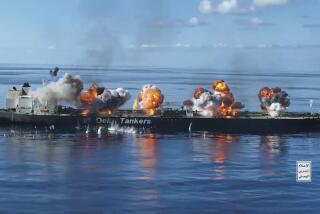Israeli Warning of Ship Hijack Plot Reported
- Share via
JERUSALEM — Israel warned the intelligence services of Italy and other friendly countries more than six months ago that it had information that terrorist groups were training to hijack a ship, a ranking Israeli military source said Tuesday.
Intelligence information that several large terrorist groups, with up to a dozen members each, were undertaking specialized training set off “red lights for us,” the source said. The source did not specify the type of training involved, but he said that based on the evidence available, it was a “natural conclusion” that the terrorists were training “specifically for a high-seas hijacking.”
“We gave a warning based on indicative signs, not on the fact that we knew that tomorrow they’re going to do it,” said the source, who spoke on condition that he not be identified.
‘Friendly Services’
The source refused to provide details of how the intelligence was gathered, but he said that it was passed on to “friendly services,” specifically including the Italians, through normal channels of contact.
Israeli terrorism experts also said Tuesday that they see an indirect link between the hijacking of the Italian cruise ship Achille Lauro and the takeover last June 14 of TWA Flight 847 by Lebanese Shia Muslim terrorists who demanded the release of 766 Arabs held in an Israeli prison. One American was killed in that incident.
Gliders and Balloons
The Israeli experts said the man believed to be in charge of the Achille Lauro hijacking masterminded terrorist attempts to infiltrate Israel by glider and balloon in the late 1970s. They identified the man, who calls himself Omar, as Abul Abbas, who is said to be operational head of the Palestine Liberation Front faction of the Palestine Liberation Organization.
“He was in charge of purchasing the gliders, of training people on the gliders and the balloons,” said one military source. Israel captured one would-be infiltrator and put his motor glider on display in an exhibition of terrorist activity.
While Abul Abbas was closely identified with PLO Chairman Yasser Arafat at the time, the source added, “what the nature of his relations are today I don’t know.” The terrorism experts spoke as the Israeli government imposed a virtual blackout on public comment concerning the latest hijacking.
The Israeli Cabinet discussed the incident Tuesday under the auspices of the Ministerial Defense Committee, whose deliberations are secret.
Answering reporters’ questions briefly after the session, Cabinet secretary Yossi Beilin would say only that Israel has received no formal request to release the 50 Palestinian prisoners whose freedom is demanded by the hijackers.
‘Several Hundred’ Held
The 50 are among “several hundred, but less than 1,000” Palestinians held in Israeli jails, according to military sources.
Speaking to reporters after lunching with visiting West German Foreign Minister Hans-Dietrich Genscher, Prime Minister Shimon Peres commented: “The ship is not in the territorial water of Israel. We didn’t get any demands and we don’t have to answer it, and Israel will continue to fight terrorism.”
Peres charged that “the terrorist organizations are really trying to spoil the chances for peace, and if we want to have peace we have to stop terrorism.” In a veiled reference to international criticism of Israel’s air raid last week on PLO headquarters in Tunis, Tunisia, Peres said, “We have to continue the momentum for peace in spite of our confrontation against terrorism and terrorists.”
Negotiations Sought
Israeli television reported Tuesday night that according to communications from the Achille Lauro to port authorities in both Beirut and Cyprus, the hijackers now want to negotiate directly with Israel.
However, a Foreign Ministry spokesman said late Tuesday that there has been no such contact. “Needless to say, we are not going to negotiate with any terrorists,” he said.
Earlier, official sources here said that “within the framework of the political fight against international terrorism, we would be willing to cooperate with every state that will ask our cooperation and to assist those who will ask us.”
Asked whether the emphasis on political action meant that Israel has ruled out a cooperative military action against the hijackers, one source, who spoke on condition of anonymity, said: “Take it as it is.”
Awkward Position
For Israel, the ship hijacking marked the second time in less than four months that it has been put in the awkward position of having demands made upon it by terrorists holding as hostage nationals of other countries.
In June, the bargaining chips were mostly Americans on the hijacked TWA flight. Washington and Jerusalem insisted that they would not give in to terrorist demands then, and the hostages--36 passengers and three crew members--were released before Israel freed the first of the 766 mostly Shia Muslim prisoners it held. By the end of the summer, all the prisoners had been released, however.
“As far as the terrorists are concerned, the TWA incident, whether you admit it or not, . . . was successful,” said a defense source. “They got what they wanted. . . . So this modus operandi, in general, is clearly something they believe is worth pursuing, whether on sea or in the air.”
Former military intelligence chief Yehoshafat Harkabi said the terrorists were also encouraged by a prisoner exchange last May in which Israel freed 1,150 convicted terrorists for three Israeli soldiers captured in Lebanon. “That set up some kind of a precedent for blackmail,” he said in an interview.
Stopping the Cycle
The TWA hijacking followed, and now the capture of the Italian ship. To stop the cycle, Harkabi said that “in some case, we shall have to say to the terrorists: ‘All right--kill the hostages. You are not going to get anywhere.’ What I fear is the spread of terrorism.”
“Terrorism is contagious,” he added. “One success tempts other people to try again.” Harkabi said it was only logical that terrorists would eventually hijack a ship.
In Washington, Cynthia M. Wilkinson, chief counsel of the merchant marine subcommittee of the House Merchant Marine and Fisheries Committee, said that among U.S. ports, only Miami “has any minimal type of security.” In foreign ports, she said, security is usually nonexistent.
During a cruise she took from Greece last summer, Wilkinson said, “There was no security at all--anyone could get on and off the ship, with just a few crew members around watching.”
The hijackers of the Achille Lauro are believed to have boarded the ship in Genoa, sources here said Tuesday.
“Look, in intelligence work you always have warnings,” said the Israeli military source who revealed his country’s earlier intelligence about a possible ship hijacking. “It’s always a question which warning you heed and which you discard.”
Without detailing specific training methods uncovered by Israeli intelligence, the source noted: “A ship is not like an aircraft. It’s not just holding a gun to the captain and telling him: ‘Send the ship here, send the ship there.’
“There are certain operations that you have to take care of” aboard ship, the source added. “You have to be in control of the engine department, and you have to be upstairs in the navigation department, and the radio, and all that stuff. They’ve been trained to take over a ship like that.”
More to Read
Sign up for Essential California
The most important California stories and recommendations in your inbox every morning.
You may occasionally receive promotional content from the Los Angeles Times.










